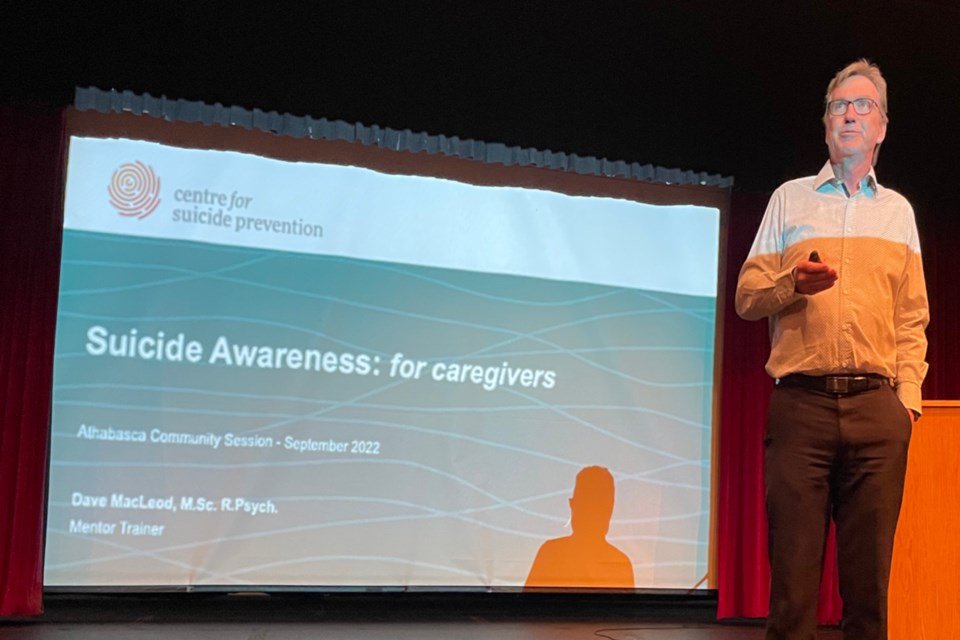ATHABASCA — Mental health and the stigma of suicide tend to be talked about in whispers and behind closed doors.
But after Angela Kuzyk’s son Rylan Wagner took his own life last year she decided to lay bare her soul and speak about the demons that haunted him and how, in retrospect, there were signs he was about to take his life. She shared those insights during two Sept. 7 sessions at the Nancy Appleby Theatre.
“I’m looking backwards with knowledge of the end result,” said Kuzyk.
When Wagner’s boss and co-worker showed up that July morning because he hadn’t arrived for work, Kuzyk admitted she made light of it, but knew deep down something was wrong and when he was found dead, she held him.
“Well Ry, I guess I don’t have to worry about you anymore,” she whispered to her son. “This is as bad as it gets.”
Kuzyk knew her son was clinically depressed, and he had been seeking treatment, but she was never quite able to bring herself to talk about suicide with him, so she wanted to tell her story to save even just one person from having to experience her profound grief.
The two sessions were organized by Kuzyk’s friend Lisa Stocking who had raised over $10,000 for the Centre for Suicide Prevention (CSP) the year before doing a stand-up paddle board (SUP) trip from the headwaters of the Athabasca River to the Town of Athabasca.
“While looking around this room today, I see how we're all here to learn more about a difficult topic,” Stocking said to the 40 people at the noon session. “What many of you may not be aware of is my friend Angela Kuzyk was actually the first person to donate. I had mentioned at the time, it would be great for her to join me on the river. Little did we know the turn of events that would unfold, bringing us closer together on the water.”
It was only a week after donating Kuzyk would hold her son for the last time and this past winter Stocking asked the CSP to hold a suicide awareness presentation in Athabasca with Dave MacLeod, a registered psychologist.
MacLeod spoke about myths, saying talking to a youth about suicide does not plant the idea; warning signs like giving items away, paying off debts, major personality changes; facts like it is not middle-aged men who make up the highest demographic; and how to talk about suicide.
“They aren’t going towards death,” said MacLeod. “They are going away from how they are feeling.”
Kuzyk noted her son had told her he wanted to feel anything other than how he was feeling and had turned to drug use to escape.
“Most people who think about suicide don’t do it,” said MacLeod, but when a good student suddenly has bad grades, stops hanging around with the people they’ve been hanging around with forever, suddenly go off social media, or start doing risky things, it’s time to have a talk.
“When you see something that’s different, believe your gut,” he said,
When someone is suicidal, they feel there are two options, continue living in the mental, physical, and/or emotional pain they are in, or die. MacLeod said to ensure they know there’s a third option – living.
“You can’t ignore they want to die, but help them find reasons to live,” he said.
And while it’s difficult, listen without judgment, and listen without forming a response and be aware of how questions are phrased. For example, asking ‘you’re not thinking of hurting yourself, are you?’ sets them up to say 'No' just to please you. Asking ‘Have you made a plan?’ can open up a whole conversation.
“Listen to their reasons for dying, but also listen for their reasons for living,” he said, stressing the words ‘to’ and ‘for.’
If you, or someone you know, is considering suicide, or you want to learn more about preventing suicide, there are resources to help:
Alberta Health Services Mental Health Help Line 1-877-303-2642
Talk Suicide Canada 1-833-456-4566 or Text 45645
Kids Help Phone-1-800-668-6868
Indigenous Hope Line 1-855-242-3310
National Trans 1-877-330-6366



